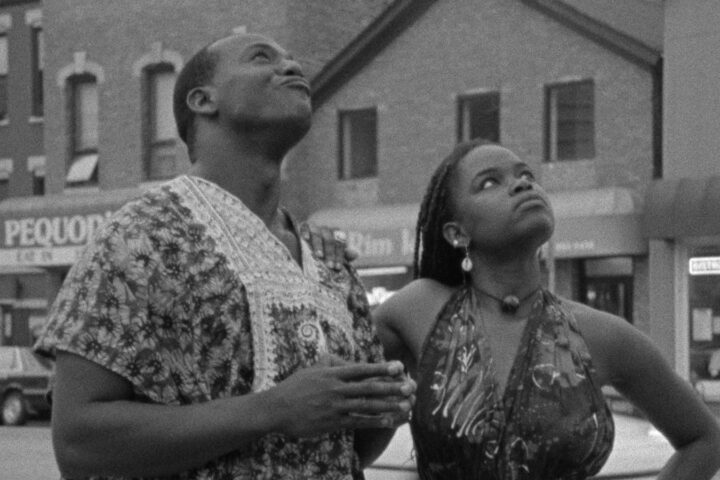The first glimpse we get of Tarrell (André Holland), a successful painter, in Exhibiting Forgiveness is in a moment of domestic bliss. He lives in a beautiful house with his singer-songwriter wife, Aisha (Andra Day), and their young son (Daniel Michael Barriere). Each day seems to begin with a cheerful family breakfast before Tarrell goes off to the spacious studio where he paints images from his childhood across towering canvases. In the evening, he and Aisha sit together while she works on her new song and he looks on in adoration.
Exhibiting Forgiveness is the first feature by internationally recognized contemporary painter Titus Kaphar, and across its early scenes, the writer-director homes in on how more than just Tarrell and Aisha’s personal relationship is based on collaboration. When they’re at home together or when they’re visiting Tarrell’s mother, Joyce (Aunjanue Ellis-Taylor), the film often takes on the appearance of a painting itself. Their happy family moments are captured in elegantly blocked tableaus, rich in color and rife with detail but never overcrowded.
“What about a little more yellow?” Tarrell suggests at the start of Exhibiting Forgiveness while listening to Aisha sing. She pauses for a moment then tries the melody again, the wall behind her actually changing color, morphing into a lush, honeyed shade to match the new sound. In such moments, you can feel Kaphar calling on his own painterly skillset in the same way.
But while Tarrell’s life might seem picture perfect, something is clearly off. He regularly wakes up screaming, tormented by memories of childhood terror. After completing a painting, he often messily blots out some of the figures in it, usually the ones depicting young Black boys. It’s clear that there are parts of his past that he cannot face or put behind him, and we learn exactly what they are when his father, La’Ron (John Earl Jelks), suddenly re-enters his life.
Exhibiting Forgiveness makes a clever narrative choice by letting us see La’Ron as he is now before flashing back to show us the man he was when Tarrell was a child. The older La’Ron, homeless and wild-haired when we first encounter him, is all gristle—a lean and wiry body that’s been chewed up and toughened by decades of hard graft. Several scenes go by before we even hear him utter a word, and when he does, he’s a warm, engulfing storyteller.
It’s galling to see how furiously Tarrell reacts to this beaten-down old man, turning him out of the house in a fit of rage. But the more we see and hear about what Tarrell endured at the hands of his drug-addicted father—worked to the bone to help La’Ron buy his next fix, barked at whenever he offered the slightest complaint—the more we understand his anger.
As Exhibiting Forgiveness progresses, Holland’s performance begins to feel reminiscent of Tarrell’s art—namely for the way the actor slowly incorporates layers of emotion into his performance, one on top of the other. The man we meet in the opening is all gentleness and tranquility, cooking pancakes for his son and jamming with his wife. Another layer arrives when we see him with his mother, frustrated at how she clings to a past that he wishes he could erase. And when his father comes back into the picture, Holland works in darker shades—fury, bitterness, and fear about what it means to be the offspring of a man like La’Ron.
Tarrell’s life comes full circle in the film’s later scenes, during an exhibition of his latest work. The gallery quickly fills up with fans of his work and patrons of art world, many of them moneyed white folk who coo over the images that more than hint at Tarrell’s harrowing childhood experiences. With every new trite compliment they offer, we can see him wondering if he hasn’t become, as Noname put it, “another artist selling trauma to [his] fanbase.”
All of these ideas—as well as matters of grief, inheritance, masculinity, and more—make their way into Kaphar’s portrait of an artist. And yet, for all its thematic heft, Exhibiting Forgiveness moves lightly, using Tarrell’s paintings like chapter breaks to help it glide between scenes. This airy quality is enhanced by Jherek Bischoff’s score, its delicate mixture of keys and strings offering the perfect mixture of wistfulness and melancholy. It’s like that early scene between Tarrell and Aisha in reverse, watching one of his paintings translated into music.
True to its name, the film puts the concept of forgiveness on display and asks us to spend some time in front of it and consider it from all angles. What does it cost to forgive those who have hurt us? Who’s that forgiveness really for: us or them? And if we do choose to forgive, what happens next? Exhibiting Forgiveness refuses to answer these questions tritely or to pretend that a sincere apology is a cure-all. It’s a powerful film about the marks we make on each other that can never be erased and what we choose to do with the space on the canvas that remains.
Since 2001, we've brought you uncompromising, candid takes on the world of film, music, television, video games, theater, and more. Independently owned and operated publications like Slant have been hit hard in recent years, but we’re committed to keeping our content free and accessible—meaning no paywalls or fees.
If you like what we do, please consider subscribing to our Patreon or making a donation.





